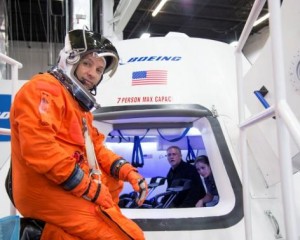
(Reuters) – NASA will partner with Boeing and SpaceX to build commercially owned and operated “space taxis” to fly astronauts to the International Space Station, ending U.S. dependence on Russia for rides, officials said on Tuesday.
The U.S. space agency also considered a bid by privately owned Sierra Nevada Corp, but opted to award long-time aerospace contractor Boeing and California’s SpaceX with contracts valued at a combined $6.8 billion to develop, certify and fly their seven-person capsules.
Boeing was awarded $4.2 billion to SpaceX’s $2.6 billion. SpaceX is run by technology entrepreneur Elon Musk, also the chief executive officer of electric car manufacturer Tesla Motors.
“SpaceX is deeply honored by the trust NASA has placed in us,” said Musk, a South Africa-born, Canadian American billionaire. “It is a vital step in a journey that will ultimately take us to the stars and make humanity a multi-planet species.”
The awards position Boeing and SpaceX to be ready for commercial flight services in 2017, said Kathy Leuders, manager for NASA’s Commercial Crew program. She said both contracts have the same requirements.
“The companies proposed the value within which they were able to do the work and the government accepted that,” Leuders told reporters in a conference call.
The contract has taken on new urgency given rising tensions between the United States andRussia over its annexation of the Crimea region of Ukraine and support for rebels in eastern Ukraine.
Boeing’s CST-100 spaceship would launch aboard Atlas 5 rockets, built by United Launch Alliance, a partnership of Lockheed Martin Corp and Boeing. SpaceX, which already has a $1.3 billion NASA contract to fly cargo to the space station, intends to upgrade its Dragon freighter to carry astronauts.
NASA has said that in addition to test flights, the awards would include options for between two and six operational missions.
By flying astronauts commercially from the United States, NASA could end Russia’s monopoly on space station crew transport. The agency pays $70 million per person for rides on Russian Soyuz capsules, the only flights available for astronauts since the retirement of the U.S. space shuttle fleet in 2011.
China, the only other country to fly people in orbit besides the United States and Russia, is not a member of the 15-nation space station partnership.
NASA has spent about $1.5 billion since 2010 investing in partner companies under its Commercial Crew program. Boeing and SpaceX have won most of NASA’s development funds.
The companies retain ownership of their vehicles and can sell rides to customers outside of NASA, including private tourists.
“The work that we have underway … is making the possibility for everyone to someday see our planet Earth from space,” said Kennedy Space Center director and former astronaut Bob Cabana.
“I know a lot of us are cheering on the success of our Commercial Crew program, not because of what it means to NASA … but what it means to human spaceflight for everyone.”
The program is based on a public-private partnership that created two cargo lines to the station, a research laboratory that flies about 260 miles (418 km) above Earth.
In addition to SpaceX, NASA has a $1.9 billion contract with Orbital Sciences Corp for resupply missions.
For Boeing, the win in space is important symbolically, said Christian Mayes, an industrials analyst at Edward Jones in St. Louis, who rates Boeing stock a “hold.”
“But financially, people need to come back to Earth,” said Mayes. Boeing’s space and network businesses contribute less than 10 percent of total revenue, and a $4.2 billion contract over multiple years “is not going to move the needle,” he added.
Boeing shares closed about 0.8 percent higher.
(Additional reporting by Alwyn Scott in New York; Editing by Ros Krasny, Sandra Malerand Grant McCool)








